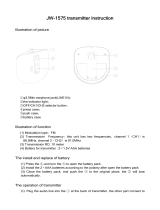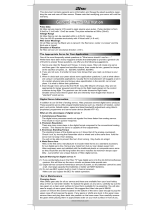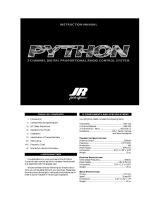Page is loading ...

HITEC 2.4GHz
Receiver Instruction
Hitec Service
12115 Paine St. Poway CA 92064
1-858-748-6948
E-mail: [email protected]
Introduction
Service & Support
Hitec Customer Service
Help is available from the Hitec oce through phone support and e-mail inquiries.
Our US oce is generally open Monday thru Friday, 8:00AM to 4:30PM PST. These hours and days may vary by
season. Every attempt is made to answer every incoming service call. Should you get voice mail, leave your
name and number and a sta member will return your call.
Hitec Web Site
Make plans to visit the Hitec website, www.hitecrcd.com, on a regular basis. Not only is it full of specs and
other information about the entire Hitec product line, our FAQ pages will eventually hold valuable information
and program update about the Spectra 2.4 module and Optima series receivers.
The On-Line Community
One of the benets of the extensive R/C online community is the vast wealth of archived knowledge available.
Hitec sponsors forums on most of the popular R/C web sites where a Hitec sta member or representative tries
to answer all manner of product related questions. Bringing together strangers with common interests is
proving to be one of the greatest gifts of
the internet. If past history is any guide to the future, we are certain
forums will be started about
the Hitec 2.4 system and several are certain to stand out as valuable archives of
information
Warranty and Non-Warranty Service
All Hitec products carry a two year from date of purchase warranty against manufactures defects.
Our trained
and professional service representative will determine if the item will be repaired or replaced. To provide all
the necessary information we need to administrate your repair, visit our website at www.hitecrcd.com and
download the repair form, ll it out and send in your item for repair.
Thank you for your purchase of the Hitec Adaptive Frequency Hopping Spread Spectrum (AFHSS) 2.4GHz
module and receiver system. This manual contains the complete directions on how to use the Optima series
receivers (version 3.00(0). We encourage you to review the entire manual before using these products.
Electric powered aircraft with Electronic Speed Control
Use this method on electric planes using ESC’s providing power to the receiver and servo functions.
OPTIMA Series Receiver Specications & Features
Receiver Connection Diagrams
Warning!
1. For maximum performance it is recommended to position the antenna at a 90 degree angle as
shown in the picture shown below.
2. The receiver antenna should not be placed near the engine, metal parts, or high current batteries.
3. When using a large number of high-power digital servos in a model, it is highly recommended to
use the SPC feature to insure the receiver always gets the power it needs in high load conditions.
If not, use the system with enough receiver battery capacity.
4. There could be a possible time-delay in receiving telemetry data from HTS-SS(sensor-station)
depending on the conditions in the area you y.
5. It is strongly recommended to use Hitec ‘s genuine Heavy Duty High Channel Switch Harness with
Receiver Charger Cord (Stock#. 54407S) for all Optima series receivers.
Full Range AFHSS 2.4GHz Receivers
BAT/CH7
CH6
DATA
SPC
LED
LED
LINK
LINK
LED
LINK
CH1
CH2
CH3
CH4
CH5
OPTIMA
OPTIMA 7
OPTIMA 7
2.4GHz 7 Channel Aircraft Receiver
2.4GHz 7 Channel Aircraft Receiver
2.4GHz 7 Channel Aircraft Receiver
AFHSS
2.4GHz
Telemetric
ADAPTIVE
FREQUENCY HOPPING
SPREAD SPECTRUM
SERVOSERVO
SERVOSERVO
SERVO SERVO
Power Battery
Motor
BEC
ESC
BAT/CH7
CH6
DATA
SPC
LED
LED
LINK
LINK
LED
LINK
CH1
CH2
CH3
CH4
CH5
OPTIMA
OPTIMA 7
OPTIMA 7
2.4GHz 7 Channel Aircraft Receiver
2.4GHz 7 Channel Aircraft Receiver
2.4GHz 7 Channel Aircraft Receiver
AFHSS
2.4GHz
Telemetric
ADAPTIVE
FREQUENCY HOPPING
SPREAD SPECTRUM
SERVOSERVO
SERVO
SERVO SERVO
Receiver
Battery
SERVO
Engine
1. Function Button
- Used for binding the receiver to a module or Hitec 2.4 built-in transmitters,
entering the FAIL-SAFE or Hold feature.
2. Dual LED Status Indicator
- Indicates the set-up process codes and current status of the receiver.
3. Channel Output and Battery Input Ports
- The ports for battery power input and servos, gyros and other accessories output port are located at the
side end of the Optima receivers.
4. SPC (Supplementary Power Connection)*
- Power the Optima receiver function with up to a 35V. electric aircraft motor battery.
Details about the SPC system can be found in page 2.
5. Telemetry Sensor and Data Port*
- A three pin servo plug connector port is featured on the Optima 7 and Optima 9. (Optima 6 is not applicable.)
Using the HPP-22 PC interface accessory this port serves to facilitate upgrading the devices software and
interfacing the optional onboard sensor station.
6. BODA (Boosted Omni Directional Antenna) System*
- Hitec’s exclusive 2.4GHz BODA System will show you another meaning of using 2.4GHz system, this
single antenna with Omni-directional booster makes whole lot easy to install the 2.4GHz antenna. Intensive
test have proven that the single BODA system in our 6 & 7 channel systems is better than or equal
to our competitors dual antenna systems while our Optima 9 receiver features a dual BODA system to give
the added security that larger models need. Installation is easy and simple, insert the antenna into the
supported antenna holder and stick it to the desired spot you wish to install.
Compatibility
- The OPTIMA & MINIMA series receivers are compatible with transmitters using the Hitec AFHSS 2.4 GHz
system, such as, Spectra 2.4 module or dedicated built-in module AFHSS 2.4 Hitec transmitters.
FAIL-SAFE/Hold Mode Selectable
- Servos and other accessories position can be set with a FAIL-SAFE point, if power to the receiver is lost.
See page 2 for details.
Low Onboard Battery Warning Function
Know when the on-board battery is low with a warning alarm from the transmitter while you are ying.
Review the Low Battery alarm features that use direct telemetry feedback to your transmitter on page 2.
Jumper*
The jumper is installed at the factory and is used when the receiver is powered by an electronic speed control,
a commercially available B.E.C. (battery eliminator circuit), dedicated 4.8 to 6V. NiMH battery pack, or regulated
Li-Po battery. The jumper is removed when the receiver is powered using the SPC feature as described in more
detail on page 2.
*These functions/ features are only for OPTIMA series recever
-To see a receiver connection diagram for the SPC feature, see page 2.
Note
Operating Voltage for Minima series : 3.7~9.0V From receiver battery power or speed control (ESC) power.
Operating Voltage for Optima series : 4.8~35V Using SPC function.
Max Current Consumption : 190mA
Recommended Position
• Risk of explosion if battery is replaced by an incorrect type.
Dispose of used battery according to the instructions.
European CE notice to users and product statements
- Frequency Range : 2409.2 MHz ~ 2474.0 MHz
- Maximum RF Output power : 100mW
- Hereby, HITEC RCD INC, declares that our (RE type : OPTIMA6, OPTIMA6 Lite, OPTIMA7, OPTIMA9, MINIMA 6E) is in compliance
with RED 2014/53/EU. The full text of the EU DoC is available at the following internet address:
ww w.multiplex-rc.de
• FRANCE Frequency Range : 2.4056GHz~ 2.4482GHz
FCC notice to users and product statements
THIS DEVICE COMPLIES WITH PART 15 OF THE FCC RULES.
Operation is subject to the following two conditions; (1) this device may not cause harmful interference,
and (2) this device must accept any interference received, including interference that may cause undesired operation.
CAUTION: Changes or modications not expressly approved by the party responsible for
compliance could void the user’s authority to operate the equipment.
6
6
OPTIMA 7
OPTIMA 9
6
OPTIMA 6
6
(version 2.0)
SERVOSERVO SERVO SERVO
Receiver
Battery
SERVO
Engine
2.4GHz 6 Channel
2.4GHz 6 Channel
Aircraft Receiver
Aircraft Receiver
SERVOSERVO SERVO SERVO
Power Battery
Motor
SERVO
BEC
ESC
2.4GHz 6 Channel
2.4GHz 6 Channel
Aircraft Receiver
Aircraft Receiver
MINIMA 6T
2.4GHz 6 Channel
Aircraft Receiver
MINIMA 6E
2.4GHz 6 Channel
Aircraft Receiver
CH1
CH1
CH1
CH1
CH1
CH6/BAT
Receiver Model Size Weight
Stock Number
MINIMA 6T
1.19 x 0.81 x 0.27in (30.4 x 20.8 x 7.11mm)
0.22oz (6.5g) 26610
MINIMA 6E
1.24 x 0.81 x 0.42in (31.7 x 20.8 x 10.9mm)
0.22oz (6.5g) 26612
OPTIMA 6 LITE
1.76 x 1.11 x 0.29in (44.9 x 18.4 x 7.40mm)
0.33oz (9.4g) 29438
OPTIMA 6
1.81 x 0.82 x 0.47in (46.1 x 21.3 x 12.1mm)
0.52oz (15g) 28410
OPTIMA 7
2.20 x 0.79 x 0.43in (56.9 x 20.8 x 11.6mm)
0.60oz (17g) 28414
OPTIMA 9
1.85 x 1.14 x 0.59in (47.7 x 29.1 x 15.5mm)
0.77oz (22g) 28425
OPTIMA 6
LITE
Glow, gas or electric powered aircraft using a separate receiver battery supply.
Follow this connection diagram when using a regulated Li-Po, or 4.8 to 6V receiver battery.
Hitec RCD Korea, Inc. (43, Yangcheong 3-gil, Ochang-eup, Cheongwon-Gu, Cheongju-si, Chungcheongbuk-do, Korea) / www.hitecrcd.com / Made in the Philippines
www.hitecrcd.com
www.hitecrcd.com

SPC (Supplementary Power Connection) System
Telemetry System
Hitec’s exclusive optional receiver power system allows you to directly power the receiver from the main
motor
power battery of an electric powered aircraft. Up to 35 Volts can be fed directly into the receiver to power
JUST THE RECEIVER FUNCTION. It will not power the servos. Almost all servos will burn-up if more than 6 Volts
are used over a short period of time.
The Hitec Spectra 2.4 Module and Optima Series receivers feature full telemetry capabilities (except Optima 6)
and include a Low Receiver Battery Warning as a basic function.
I. Basic Function: Low Onboard Battery Warning - for All Optima Receivers
When Optima series receiver powered up, it will automatically detect the battery voltage level and
recognizes between 4 cell or 5 cell NiMH and NiCd batteries. (4 cell < 5.8V < 5 cell)
In case of 2cell LiPo battery is being used you can customize the battery warning level by using HPP-22 PC
program.
- When battery level is safe (4 cell > 4.5V, 5 cell > 5.6V): no changes for LED lights.
- When battery level is low (4 cell < 4.5V, 5 cell < 5.6V): Blue LED glows constantly and the red LED will
blink fast. You will hear three-continuous beeping alarm from the module as a low receiver battery warning.
Upon hearing the alarm, we advise you to land at once.
II. Optional Functions:
GPS, FUEL, TEMP, O-RPM, M-RPM, VOLT, Amp Sensors - Applicable for Optima 7 & 9 Only
- There are more devices available in the future. Check the Hitec website at www.hitecrcd.com for more
up-to-dated information.
SERVOSERVO
SERVOSERVO
SERVO SERVO
Power Battery
Motor
BEC
ESC
BAT/CH7
CH6
DATA
SPC
LED
LED
LINK
LINK
LED
LINK
CH1
CH2
CH3
CH4
CH5
OPTIMA
OPTIMA 7
OPTIMA 7
2.4GHz 7 Channel Aircraft Receiver
2.4GHz 7 Channel Aircraft Receiver
2.4GHz 7 Channel Aircraft Receiver
AFHSS
2.4GHz
Telemetric
ADAPTIVE
FREQUENCY HOPPING
SPREAD SPECTRUM
SPC Connection Diagram
- Low Battery Warning function is only for your references the actual battery level could be
dierent. Especially Battery Memory Eects, also known as Lazy Battery Eect or Battery
Memory, could aect Low Battery Warning function to be worked properly.
- When 2.4GHz system and HV servos are used together, we strongly recommend using large
capacity battery pack with fully charged condition, and constantly monitor the battery status.
Warning
- Some Hitec servos are rated to be used at 7.4Volts. You will still need to supply power for your
servos with a four or ve cell NiMH receiver battery or 2 cell Li-Po and regulator set-up.
- The SPC system was partially created to be integrated into future Hitec telemetry system devices.
Check the Hitec web site for more information on the availability of telemetry systems in the future.
Note
- If FAIL-SAFE is deactivated, the FAIL-SAFE position settings are also deleted!
- The FAIL-SAFE settings should be checked every time before you run the engine/motor.
Note
FAIL-SAFE and Hold Mode Setup
If you use the FAIL-SAFE function, and set it up properly, should the receiver signal somehow be interrupted or
interference were to occur, the servos will move to your pre-set FAIL-SAFE point you previously stored in the
receiver during the FAIL-SAFE set-up.
If FAIL-SAFE has not been activated, the signal is switched o after the HOLD period of 1 sec. This means that
the servos become “soft” and remain in their last commanded position under no load (this may equate to
full-throttle!), until a valid signal is picked up again.
In the interests of safety, we recommend that FAIL-SAFE should always be activated, and the FAIL-SAFE settings
should be selected so as to bring the model to a non-critical situation. (e.g. motor idle / electric motor OFF,
control surfaces neutral, airbrakes extended, aero-tow release open, etc.)
Testing the FAIL-SAFE Setting
a. Move the sticks to positions other than the FAIL-SAFE settings, and then switch o the transmitter.
The servos should now move to the FAIL-SAFE positions previously stored, after the I sec HOLD period
How to turn FAIL-SAFE O and reactivate the Hold Mode
a. Switch on the transmitter, then the receiver. Wait for the system to boot and you have control over the model.
b. Press and hold the receiver function button for 6 seconds and release it. After 2 seconds the red and
blue LEDs will blink rapidly.
c. Immediately press the button once.
d. FAIL-SAFE Mode is now deactivated and HOLD mode is activated.
e. Turn the transmitter o, then the receiver o.
f. Turn the system back on to use it.
Fail-Safe position
Switch on both.
Wait for the system to boot and control over
the model.
Press and hold the button on the receiver until LED turns o
(approx. 6 second)
Release the button. After 2 seconds both red and blue LEDs blink alternately.
the receiver will count 5 seconds during that time move all the transmitter
sticks and other controls to the desired FAIL-SAFE positions
(e.g. motor idle, control surfaces neutral), and hold until blink stops.
When Blink stops the system will temporary
remember the FAIL-SAFE position, turn o
the system to save and exit.
www.hitecrcd.com
Link (ID-Setting)
Too Close: Less than 50Cm(18in)
Too Far: More than 5M(15ft)
- Link must be done within 15ft(5m). of the transmitter and receiver.
- Transmitter and receiver need to be at least 18in(50cm). from each other to link properly.
Note
Press and hold the link button on Receiver and turn on the power.
Press and hold the button on the module,
and turn on the transmitter.
Both RED, BLUE LEDs will blink rapidly
to nd the transmitter signal.
Release the link button when
RED LED on receiver glows steady.
When the link is completed, BLUE LED on the
module will blink while BLUE LED on the receiver
glows steady.
Release the link button.
Check if BLUE LED is blinking.
If RED LED is blinking, press
the link button for 2 sec., so
that LED changes to the BLUE.
C
C
C
C
C
Bot
Bot
Bot
Bot
Bot
Bot
Bot
Bot
Bot
Bot
Bot
Bot
Bot
Bot
Bo
Release the link button.
When the link is completed, BLUE LED on the
module will blink while RED LED on the module
glows steady.
2.4GHz 6 Channel
2.4GHz 6 Cha
nnel
Aircraft Receiver
Aircraft Receiver
2.4GHz 6 Channel
2.4GHz 6 Cha
nnel
Aircraft Receiver
Aircraft
Receiver
Channel
2.4GHz 6 Channel
R
eceiver
Aircraft Receiver
Check if RED LED is blinking.
If BLUE LED is blinking,
press the link button for 2 sec.,
so that LED changes to the RED.
m
m
m
m
m
m
m
m
m
m
m
m
m
m
m
m
m
m
m
m
m
m
m
m
m
m
m
m
m
m
m
Non-telemetry RXs (MINIMA & MICRO Series) Telemetry RXs (OPTIMA Series)
Link (ID-Setup or Bind)
Your Hitec AFHSS system uses a communication protocol that links and binds the Hitec 2.4GHz receiver to
your transmitter. Once the receiver and module are “bound”, no other transmitter can interfere with your
receiver during its operation. In the case of multiple model memory transmitters, you can bind as many Hitec
2.4GHz receivers to your transmitter, one per model memory as necessary.
Each module and receiver set is paired at the factory for your convenience.
Use one of the following binding methods to bind additional Hitec 2.4GHz receivers to your transmitter.
For receiver, both BLUE & RED LEDs will glow steady.
Note
- The SPC function is applicable for OPTIMA series receivers only.
Note
- The telemetry function is applicable for OPTIMA series receiver only
2Sec.
6Sec.
When they are turned on again, RED LED on the
module(or radio) and BLUE LED on the receiver
will glow steady.
When they are turned on again, you can hear
continuous beep sound. Both RED LEDs on the
module and receiver will glow steady
in normal status.
Channel
2.4GHz 6 Ch
anne
l
R
eceiver
Aircraft Receiver
To save the setting, please reboot both transmitter and receiver.
/



